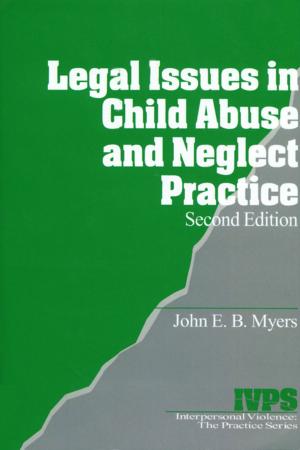| Author: | Professor Jan Kooiman | ISBN: | 9781446230916 |
| Publisher: | SAGE Publications | Publication: | February 4, 2003 |
| Imprint: | SAGE Publications Ltd | Language: | English |
| Author: | Professor Jan Kooiman |
| ISBN: | 9781446230916 |
| Publisher: | SAGE Publications |
| Publication: | February 4, 2003 |
| Imprint: | SAGE Publications Ltd |
| Language: | English |
The concept of `governance' has become a central catchword across the social and political sciences. In Governing and Governance, Jan Kooiman revisits and develops his seminal work in the field to map and demonstrate the utility of a sociopolitical perspective to our understanding of contemporary forms of governing, governance and governability.
A central underlying theme of the book is the notion of governance as a process of interaction between different societal and political actors and the growing interdependencies between the two as modern societies become ever more complex, dynamic and diverse.
Drawing upon a wide range of interdisciplinary insights, the book advances a comprehensive conceptual framework that seeks to capture the different elements, modes and orders of governing and governance. A series of useful distinctions are employed, for example, between self, `co', and hierarchical modes, and between first, second, or meta orders to illustrate the many different structures and levels of modern governance today.
Theoretically rich and illuminating, Governing and Governance will be essential reading for all students and academics across the social and political sciences, public management and public administration.
The concept of `governance' has become a central catchword across the social and political sciences. In Governing and Governance, Jan Kooiman revisits and develops his seminal work in the field to map and demonstrate the utility of a sociopolitical perspective to our understanding of contemporary forms of governing, governance and governability.
A central underlying theme of the book is the notion of governance as a process of interaction between different societal and political actors and the growing interdependencies between the two as modern societies become ever more complex, dynamic and diverse.
Drawing upon a wide range of interdisciplinary insights, the book advances a comprehensive conceptual framework that seeks to capture the different elements, modes and orders of governing and governance. A series of useful distinctions are employed, for example, between self, `co', and hierarchical modes, and between first, second, or meta orders to illustrate the many different structures and levels of modern governance today.
Theoretically rich and illuminating, Governing and Governance will be essential reading for all students and academics across the social and political sciences, public management and public administration.















